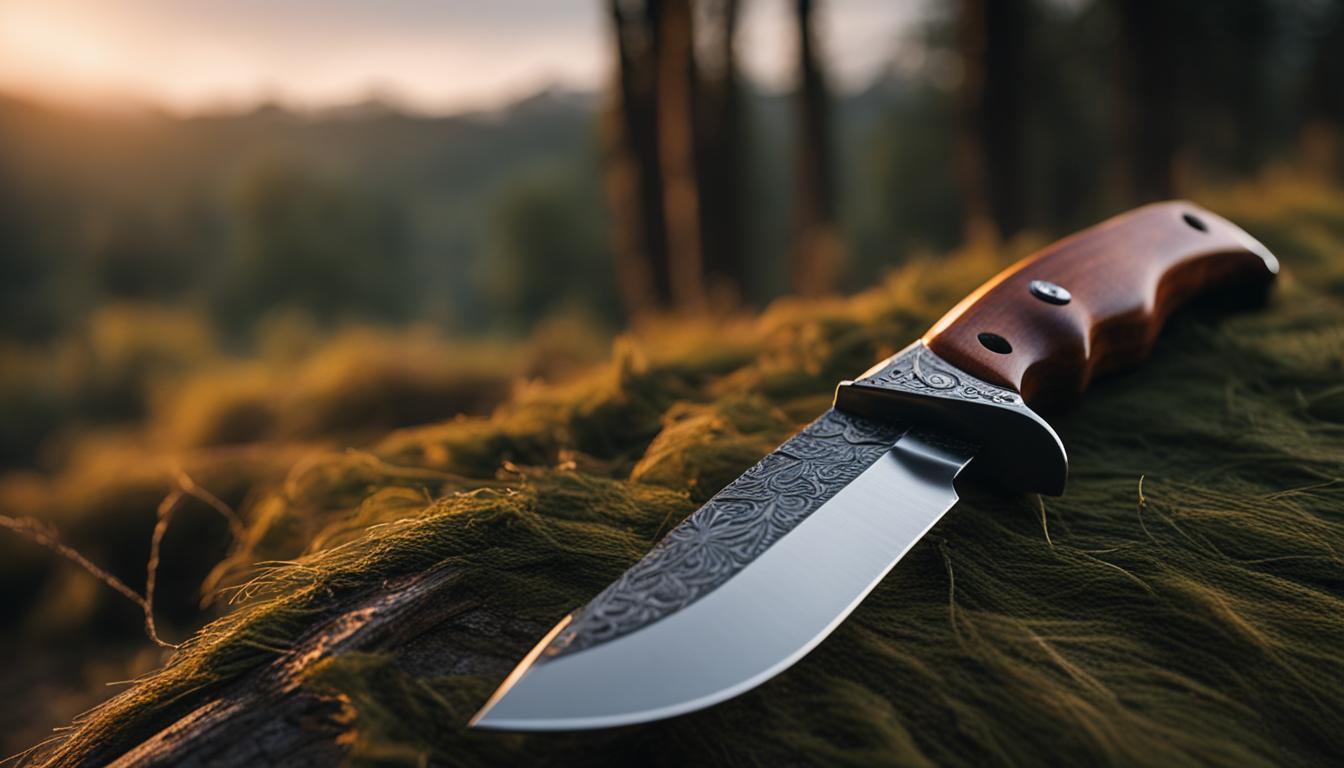As an avid hunter, it is crucial to understand the laws surrounding hunting knife ownership. Each state has its own regulations, and failure to abide by these laws can lead to legal trouble and the loss of hunting privileges. It is important to stay informed and comply with these laws to ensure the safety of yourself and others. For example, in New Jersey, there are safety zones where carrying loaded firearms or nocked arrows without written permission is not allowed. Additionally, knowing the specific hunting seasons, bag limits, and regulations of the area you are hunting in is essential to avoid any legal issues.
Key Takeaways:
- Understanding hunting knife ownership laws is crucial for avid hunters to stay compliant and avoid legal trouble.
- Each state has its own regulations, so it is important to research and know the specific laws in your area.
- Be aware of safety zones and hunting seasons to ensure the safety of yourself and others.
- Comply with bag limits and regulations to avoid any legal issues.
- Stay informed and follow these regulations to protect your rights as an avid hunter.
The Definitions of Offensive Weapons and Exceptions in Pennsylvania Knife Laws
In Pennsylvania, the laws regarding knife ownership are outlined in Title 18 of the Consolidated Statutes. Knives, along with firearms, homemade blades, tasers, razors, and explosives, can be considered offensive weapons if they have the potential to cause serious bodily injury. However, two conditions must be met for a knife to be classified as offensive: it must have an automatic mechanism for concealment and exposure, and there must be no lawful use for the knife.
Pennsylvania has a curio exception that allows individuals to possess a knife for lawful purposes such as theatrical performances, temporary possession after disarming an aggressor, and other lawful uses like hunting, fishing, kitchen use, and woodworking within one’s residence.
“The curio exception in Pennsylvania knife laws acknowledges that there are various legitimate reasons for possessing a knife. It recognizes that knives can serve a lawful purpose in certain contexts, such as using them for cooking or engaging in hobbies like woodworking. This exception ensures that individuals are not unduly restricted in their possession and use of knives while still maintaining public safety.”
It’s important to note that while owning a knife is legal, carrying one and the reason for carrying it will be scrutinized to determine if it falls within the curio exception. Law enforcement will evaluate the intent and supporting evidence of the individual carrying the knife to ascertain if it aligns with the lawful use exceptions defined by Pennsylvania knife laws.
| Offensive Weapons | Conditions for Classification |
|---|---|
| Knives | Automatic mechanism for concealment and exposure without lawful use |
| Firearms | N/A |
| Homemade blades | N/A |
| Tasers | N/A |
| Razors | N/A |
| Explosives | N/A |
The curio exception in Pennsylvania knife laws recognizes the importance of considering lawful uses for knives and provides individuals with the opportunity to possess knives within specific contexts. This exception strikes a balance between personal freedoms and public safety, ensuring that individuals have the ability to engage in legitimate activities while still prohibiting the possession of offensive weapons without lawful justification.
Limitations and Restrictions on Carrying Knives in Pennsylvania
When it comes to carrying knives in Pennsylvania, there are certain limitations and restrictions that must be followed in order to stay within the boundaries of the law. The legality of carrying a knife is determined by the intent, explanation, and supporting evidence provided by the individual carrying it. Law enforcement officers may ask individuals to explain why they have a knife and where they are carrying it, and they will assess whether the purpose is lawful and if there is evidence to support this claim. It is important to note that carrying a knife with the intent to harm or commit a criminal act is strictly prohibited and can result in legal consequences.
There are certain areas where carrying a knife is unconditionally illegal. Primary and secondary schools, as well as court facilities, are examples of such restricted areas. It is important to be aware of these areas and to understand that carrying a knife within them is strictly prohibited. To avoid any legal issues, individuals should always have a lawful purpose for carrying a knife and ensure that they are not crossing any boundaries set by the law.
Understanding the lawful use of knives is another important aspect of knife carrying laws in Pennsylvania. While owning a knife is legal, the way it is used may be subject to specific regulations. For example, using a knife for hunting, fishing, kitchen purposes, or woodworking within the confines of one’s residence is considered lawful use. However, it is crucial to keep in mind that the lawful use of a knife may be restricted in certain areas, such as the aforementioned restricted areas or other specific locations designated by the law.
| Restricted Areas | Lawful Use of Knives |
|---|---|
| Primary and secondary schools | Hunting |
| Court facilities | Fishing |
| Kitchen use | |
| Woodworking within one’s residence |
By understanding the limitations and restrictions of carrying knives in Pennsylvania, individuals can ensure that they stay within the boundaries of the law. It is important to always have a lawful purpose for carrying a knife, avoid restricted areas, and comply with the specific regulations set by the state. By doing so, individuals can enjoy the convenience and utility of carrying a knife while avoiding any legal complications.
Knife Laws and Felonies in Pennsylvania
When it comes to knife ownership laws in Pennsylvania, individuals with felonies face specific restrictions. In accordance with the law, people with felonies are prohibited from carrying knives in public places, similar to the prohibition on firearms and other offensive weapons. The aim of these laws is to ensure public safety by preventing potential harm or criminal acts.
It is crucial for individuals with felonies to be aware of these regulations and to refrain from carrying knives or any offensive weapons in public. Failure to comply with these laws can result in serious legal consequences. Understanding the specific limitations and restrictions placed on knife ownership for individuals with felonies is essential to avoid potential legal trouble.
“Individuals with felonies are prohibited from carrying knives in public places, similar to the prohibition on firearms and other offensive weapons.”
To stay informed and compliant with knife ownership laws, individuals with felonies should familiarize themselves with the specific regulations in their state. It is recommended to consult a legal professional or local law enforcement authorities to understand the nuances of these laws and ensure full compliance.
By adhering to the laws and regulations surrounding knife ownership, individuals with felonies can navigate the legal landscape more confidently and avoid any unnecessary legal complications. Staying informed and understanding these laws is essential for maintaining personal safety and preventing any potential legal issues.
Conclusion
Understanding hunting knife laws and knife ownership regulations is essential for avid hunters. Each state has its own set of regulations and restrictions that hunters must adhere to. By staying informed about these laws, hunters can ensure they are compliant and avoid any legal complications.
Researching the specific hunting knife laws in your area is crucial to prevent any unintentional violations. Knowing safety zones, hunting seasons, bag limits, and other regulations will help hunters navigate the intricacies of knife ownership.
By being aware of lawful use exceptions and limitations on carrying knives, hunters can enjoy their hunting experiences while staying within the legal boundaries. It’s important to remember that knife ownership comes with responsibilities, and abiding by the regulations is necessary to protect our rights as hunters.
Overall, being knowledgeable about hunting knife laws and regulations is key to enjoying the sport responsibly. It ensures the safety of ourselves and others and helps us maintain our hunting privileges. So, before heading out on your next hunting trip, take the time to familiarize yourself with the knife ownership laws in your state and hunt within the legal framework.
FAQ
Do hunting knife ownership laws vary by state?
Yes, hunting knife ownership laws can vary by state. It’s important for avid hunters to stay informed about the specific laws in their state to ensure compliance.
What are safety zones in New Jersey?
Safety zones in New Jersey are areas where hunters cannot carry loaded firearms or nocked arrows without written permission. It’s crucial to be aware of these safety zones and hunt responsibly to ensure the safety of yourself and others.
What are the conditions for a knife to be classified as offensive in Pennsylvania?
In Pennsylvania, a knife can be considered offensive if it has an automatic mechanism for concealment and exposure, and there is no lawful use for the knife.
Are there exceptions to knife ownership laws in Pennsylvania?
Yes, Pennsylvania has a curio exception that allows individuals to possess a knife for lawful purposes such as theatrical performances, temporary possession after disarming an aggressor, and other lawful uses like hunting, fishing, kitchen use, and woodworking within one’s residence.
Are there any restrictions on carrying a knife in Pennsylvania?
Yes, the legality of carrying a knife in Pennsylvania depends on the intent, explanation, and supporting evidence of the individual carrying it. Certain places like primary and secondary schools and court facilities unconditionally prohibit carrying a knife. It’s important to have a lawful purpose for carrying a knife and to be aware of these restricted areas to avoid legal issues.
Are individuals with felonies allowed to carry knives in Pennsylvania?
No, individuals with felonies are prohibited by law from carrying knives in public places, along with other offensive weapons like firearms. It’s important for individuals with felonies to be aware of these laws and refrain from carrying knives or any offensive weapons in public to avoid legal trouble.





